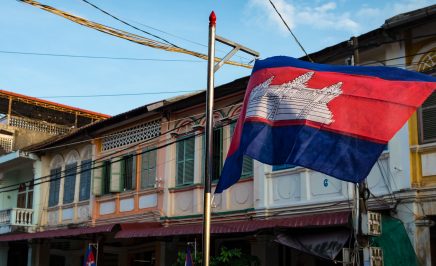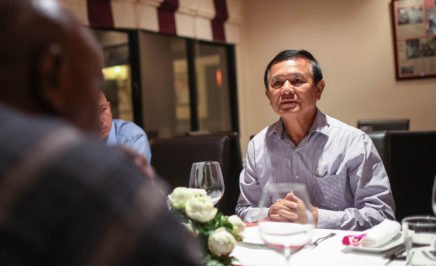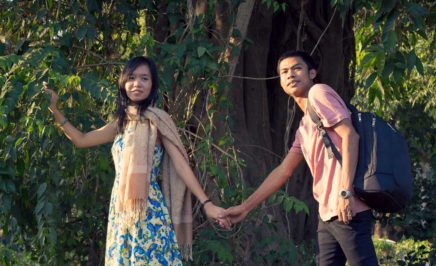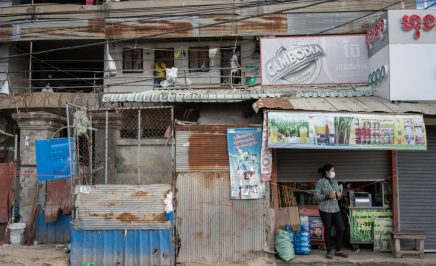Responding to reports that that four environmental activists affiliated with Mother Nature Cambodia – Sun Ratha, Ly Chandaravuth, Yim Leanghy and Alejandro Gonzalez-Davidson – face up to 15 years in prison after being charged with “plotting” and “insulting the King” (lèse majesté), Ming Yu Hah, Amnesty International’s Deputy Regional Director for Campaigns, said:
“These outrageous charges are a blatant attempt to silence and intimidate not only Mother Nature Cambodia, but an entire generation of Cambodian youth who have dared to stand up for human rights and environmental justice. These charges should be dropped immediately and Sun Ratha, Ly Chandaravuth and Yim Leanghy should be released immediately and unconditionally.
“The severity of these charges marks a serious escalation in the Cambodian authorities’ repressive tactics against environmental defenders and critical voices. It is unconscionable that such serious charges have been laid against these activists in retaliation for their peaceful efforts to defend Cambodia’s natural resources.
“It is alarming that the authorities appear to be engaging in unlawful surveillance of environmental activists in order to concoct evidence of far-fetched conspiracies. Time and time again the Cambodian government has characterized critics of the government as rebels and conspirators, and painted peaceful activism as a crime.
“These charges are just the latest chapter in the authorities’ relentless assault on youth activists and environmental defenders. Mother Nature Cambodia activists continue to face the wrath of the government because they have consistently shone a light on the widespread corruption which so often facilitates and enables environmental destruction in Cambodia.
“Instead of targeting brave young environmentalists, the authorities should prosecute the government officials, military officers and well-connected business actors who are often complicit in the destruction of Cambodia’s forests, mangroves and coastlines.”
Background:
The activists face up to 15 years in prison after being charged with “plotting” and “insulting the King” (lèse majesté) under Articles 453 and 437(bis) respectively of Cambodia’s Criminal Code.
Sun Ratha and Ly Chandaravuth, along with another environmental activist named Seth Chhivlimeng, were arrested at approximately 10.45am on Wednesday, 16 June while investigating river pollution in the Tonle Sap river in Phnom Penh. On the same morning, Yim Leanghy was arrested after being asked to go to his local police station in Kandal province. Seth Chhivlimeng was later released after being detained for 24 hours.
On Monday 21 June, Phnom Penh Municipal Court Investigating Judge Im Vannak confirmed that Sun Ratha and Yim Leanghy were charged with both “plotting” and “insulting the King”, while Ly Chandaravuth was charged with “plotting” only. Yim Leanghy and Ly Chandaravuth were sent to pre-trial detention in CC1 prison and Sun Ratha was sent to CC2 prison. Alejandro Gonzalez-Davidson was charged with both “plotting” and “insulting the King” in absentia.
Following the arrests, local media quoted a government spokesperson who justified the arrests on the basis that Mother Nature Cambodia “got foreign money to commit rebellious actions to incite [people] to topple the government”.
According to Cambodian human rights group LICADHO, Yim Leanghy is a 32-year-old student who obtained a scholarship to study for a master’s degree at the Royal University of Phnom Penh’s Institute of Foreign Languages. Sun Ratha is a 26-year-old accountant who graduated from the University of Cambodia, where she was also studying on a scholarship. Ly Chandaravuth is a 22-year-old student in his 4th year of studying law at the Royal University of Law and Economics. Alejandro Gonzalez-Davidson, a Spanish national and co-founder of Mother Nature Cambodia, was deported from Cambodia in 2015 and has been refused re-entry since then.
Amnesty International has received credible information that the evidence being used against the activists includes recordings of private Zoom meetings held by Mother Nature Cambodia activists.
Surveillance of private communications is unlawful unless it is grounded in a national law which complies with international human rights law governing the right to privacy. Cambodia’s 2015 Law on Telecommunications permits the Cambodian government to undertake unfettered surveillance of digital communications in the absence of adequate safeguards and oversight, in violation of the right to privacy as guaranteed by international human rights law. The International Covenant on Civil and Political Rights, which Cambodia has ratified, guards against arbitrary and unlawful intrusion of privacy (Article 17). International human rights standards also require that any interference by the state on the right to privacy should be lawful, necessary, proportional, and legitimate.
Mother Nature Cambodia is a prominent campaign group which has won several major environmental victories. Using a combination of community mobilization, direct action and public awareness raising, in 2015 they successfully convinced the Cambodian authorities to drop plans to build a major hydroelectric dam in Cambodia’s Areng Valley, which had gravely threatened local Indigenous communities. In 2016, their work to expose widespread environmental destruction and human rights abuses linked to the mining and export of sand from coastal areas of Cambodia led to yet another major victory – a total export ban on coastal sand announced by the Cambodian government.
Mother Nature Cambodia activists have faced a litany of repression in recent months and years, with many activists arbitrarily charged and imprisoned. The group has been accused of “causing chaos in society” and characterized as “illegal” by Cambodia’s Ministry of Interior because it is not registered under Cambodia’s notorious NGO Law.
On 5 May, the Phnom Penh Municipal Court convicted four activists from Mother Nature Cambodia of “incitement” under Article 495 of the Criminal Code and sentenced them to between 18 and 20 months’ imprisonment. Three of the convicted activists – Long Kunthea (22), Phuon Keoraksmey (19), and Thun Ratha (29) – had been held in pre-trial detention since their arbitrary arrest in September 2020 and remain imprisoned. Alejandro Gonzalez-Davidson was convicted in the same case and sentenced in absentia under the same charges to 20 months in prison.





